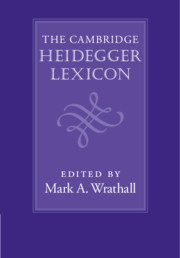Book contents
- The Cambridge Heidegger Lexicon
- Series page
- The Cambridge Heidegger Lexicon
- Copyright page
- Contents
- Contributors
- Preface
- Acknowledgments
- Using the Lexicon
- Chronology of Martin Heidegger
- Abbreviations for Heidegger’s Works
- A
- B
- C
- 32. Care (Sorge)
- 33. Certainty (Gewissheit)
- 34. Circumspection (Umsicht)
- 35. Clearing (Lichtung)
- 36. Closeness (Nähe)
- 37. Cognition (Erkenntnis)
- 38. Communication (Mitteilung)
- 39. Comportment (Verhalten, or Verhaltung)
- 40. Concept (Begriff)
- 41. Confrontation (Auseinandersetzung)
- 42. Conscience (Gewissen)
- 43. Consciousness (Bewusstsein)
- 44. Constancy (Ständigkeit)
- 45. Constitution (Konstitution)
- 46. Constitution (Verfassung)
- 47. Context (Zusammenhang)
- 48. Coping (Umgang)
- 49. Correspondence (Entsprechung)
- 50. Curiosity (Neugier)
- D
- E
- F
- G
- H
- I
- J
- K
- L
- M
- N
- O
- P
- R
- S
- T
- U
- V
- W
- German–English Glossary
- Bibliography
- Index
43. - Consciousness (Bewusstsein)
from C
Published online by Cambridge University Press: 17 April 2021
- The Cambridge Heidegger Lexicon
- Series page
- The Cambridge Heidegger Lexicon
- Copyright page
- Contents
- Contributors
- Preface
- Acknowledgments
- Using the Lexicon
- Chronology of Martin Heidegger
- Abbreviations for Heidegger’s Works
- A
- B
- C
- 32. Care (Sorge)
- 33. Certainty (Gewissheit)
- 34. Circumspection (Umsicht)
- 35. Clearing (Lichtung)
- 36. Closeness (Nähe)
- 37. Cognition (Erkenntnis)
- 38. Communication (Mitteilung)
- 39. Comportment (Verhalten, or Verhaltung)
- 40. Concept (Begriff)
- 41. Confrontation (Auseinandersetzung)
- 42. Conscience (Gewissen)
- 43. Consciousness (Bewusstsein)
- 44. Constancy (Ständigkeit)
- 45. Constitution (Konstitution)
- 46. Constitution (Verfassung)
- 47. Context (Zusammenhang)
- 48. Coping (Umgang)
- 49. Correspondence (Entsprechung)
- 50. Curiosity (Neugier)
- D
- E
- F
- G
- H
- I
- J
- K
- L
- M
- N
- O
- P
- R
- S
- T
- U
- V
- W
- German–English Glossary
- Bibliography
- Index
Summary
Consciousness – the capacity for thought, sentience, and awareness – is not a proprietary technical term of Heidegger’s, but it does figure frequently in his lifelong dialogue with modern thinkers from Descartes up to Husserl. As Heidegger says early in his 1923 lectures, “in Greek philosophy there is no concept of consciousness” (GA17:48). Many of his substantive discussions of realism, intentionality, temporality, etc., are tied to his engagement with modern theories of consciousness (so more may be found by looking at those entries, particularly that on intentionality).
- Type
- Chapter
- Information
- The Cambridge Heidegger Lexicon , pp. 179 - 181Publisher: Cambridge University PressPrint publication year: 2021

